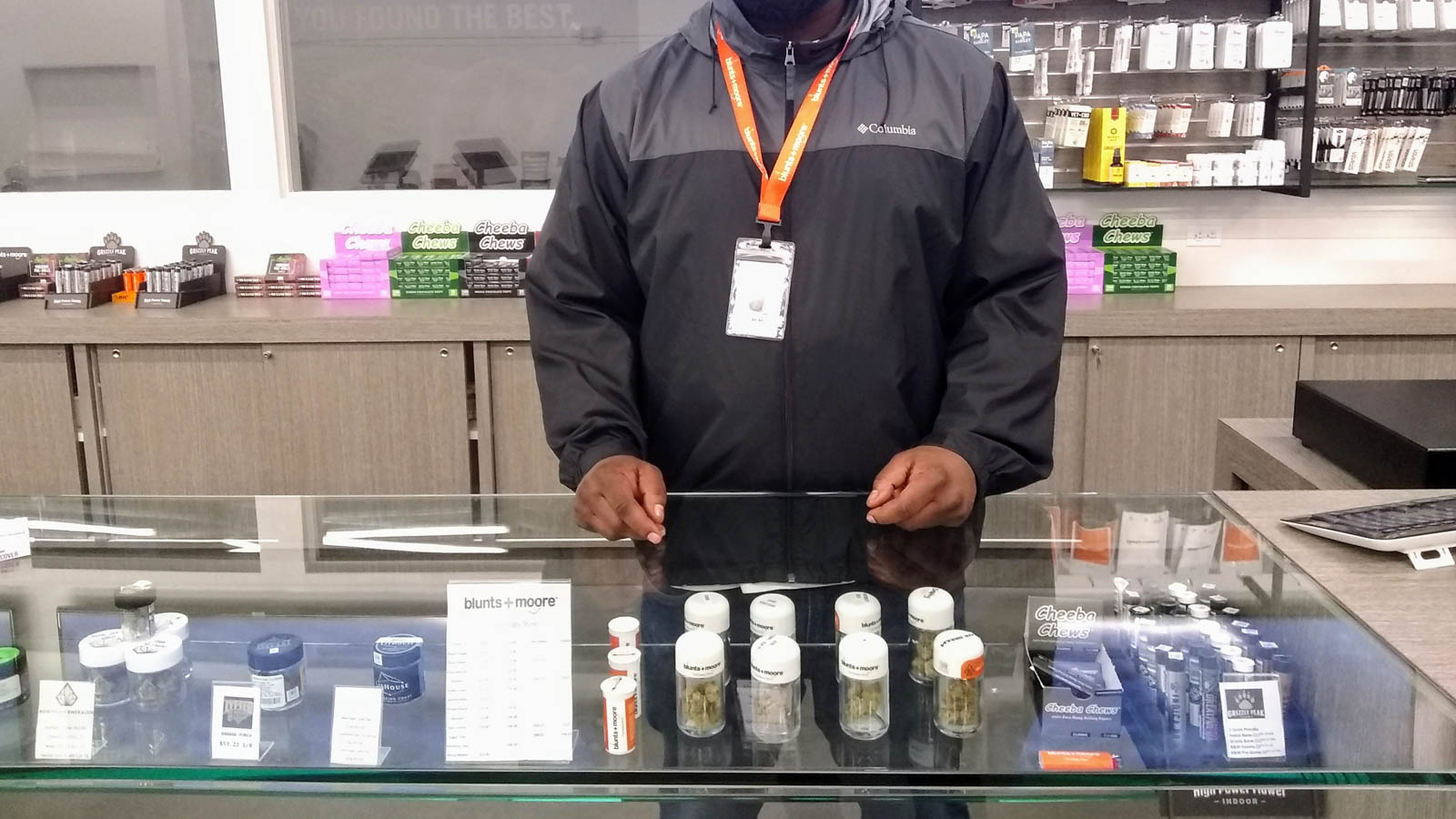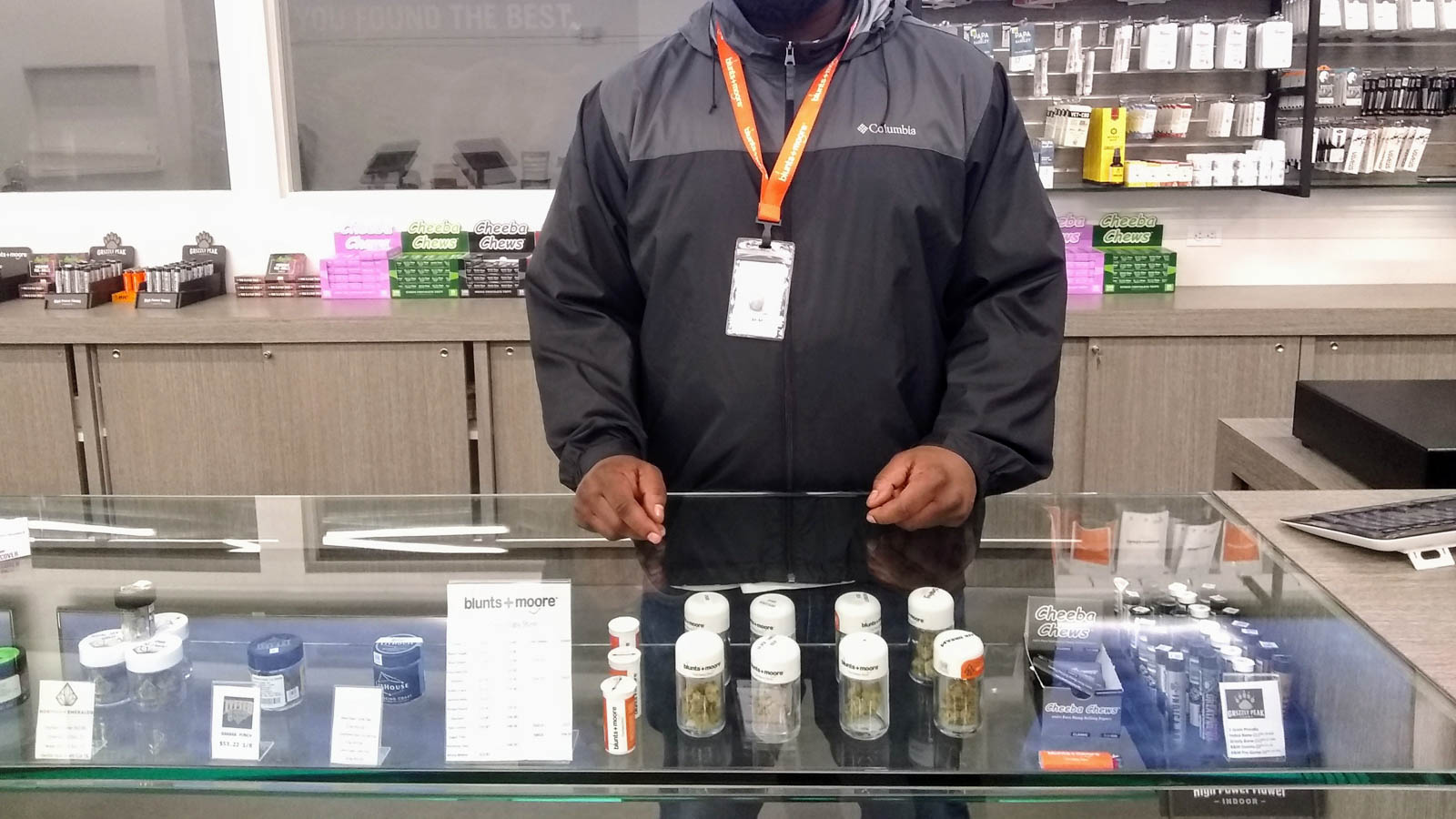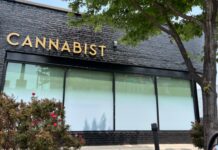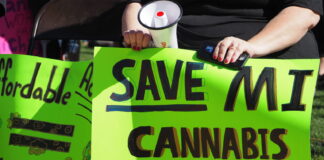
“As a kid getting in trouble for weed and now being able to walk around with weed in your pocket is more than I can fathom sometimes,” said Malcolm Turner, a budtender at Blunts + Moore, the first dispensary in the United States to open under a social equity program designed to give those hurt the most by the U.S.’s decades-long war on drugs a leg up in the new legalized cannabis landscape.
Located in a sleek, spacious warehouse space across the street from the Oakland Coliseum and the Oracle Arena, Blunts + Moore opened in November 2018, as the pioneer of Oakland‘s Cannabis Equity Program. Oakland’s social equity program, which was launched in 2017 immediately after Californians in November 2016 passed the Adult Use of Marijuana Act, which legalized recreational use, is the first in the nation and is aimed at ensuring that the potential payoff of the multi-billion-dollar Green Rush does not skip communities and individuals that have already paid heavy prices. The program put the entrepreneurs on the fast track to being granted a license.
Blunts+Moore in Oakland, California, is the first in the United States to benefit from social equity rules giving preferential marijuana dispensary licenses to minority business owners and individuals who faced criminal charges for marijuana-related offenses. (Photo by Ocean Malandra)
The program mandates that 50% of new cannabis-related businesses in Oakland must be run by people who have either been convicted of a cannabis-related crime or have lived in one of the 20 or so designated districts with disproportionate numbers of cannabis-related arrests for 10 of the last 20 years. For Turner, who had a marijuana-related offense on his record, his past legal troubles helped qualify him for a job at the dispensary.
“I was the general manager of a couple of dispensaries out there (Denver), and because of my business background, I was very good at what I did,” Blunts + Moore co-owner Brittany Moore told Weedmaps News. “We saw (former Oakland City Council member) Desley Brooks on Vice ‘Weediquette’ and she was talking about the initiative. She wanted people of color to have ownership in dispensaries, and my mother and I looked at each other like, wait, what, did you hear that?
“We found our equity partner, an Oakland native, through a friend of a friend of my mom. When I found out his name was Blunt I was like, this is meant to be, we are going to have a dispensary,” said Moore, adding that the mutual friend was Michael Marshall, who was a guest vocalist on the hip-hop duo Luniz‘s 1995 weed anthem “I Got 5 On It.”
Moore’s business partner Alfonso Blunt, a fourth-generation Oakland resident, was arrested for possession of marijuana as a teenager. His connections in the San Francisco Bay Area hip-hop and cannabis scenes, plus Moore’s background in finance (she worked at Morgan Stanley in Atlanta for years), is a winning combo for the East Oakland dispensary, which gets lots of “respect in the area,” according to Moore.
“The fact that they have an equity program at all and to see people like Brittany and Alfonso be involved in it, people that grew up the same as we did, is crazy,” said budtender Turner, who also had his own run-ins with the law over petty possession of cannabis growing up in Oakland.
Oakland, California, stipulates social equity provisions for its licensed marijuana dispensaries. The city requires that at least half of dispensaries must be run by individuals convicted of a marijuana-related offense or live in designated areas where anti-drug enforcement was intense. (Photo by Ocean Malandra)
But Oakland is not the only place in the country that suffered under cannabis prohibition. San Francisco, Sacramento, and Los Angeles have all followed Oakland’s lead and implemented equity programs. Massachusetts passed the first-ever statewide social equity program designed to open up access to the legal industry to those with a cannabis-related criminal record or an address in hard-hit areas — almost a carbon copy of Oakland’s initiative.
“D.C. is working on it, Chicago is working on it. I call them these chocolate cities with diverse populations that are working on it,” said Moore, explaining how they now find themselves a model for the fast-growing cannabis equity movement in cities and communities across the country where drug war policies disproportionately harmed African-Americans and other minorities.
“We have had cities reach out to us and ask for help,” she said.
But Oakland’s equity program is not without its snags and potential pitfalls according to Jeff Jones, a long-time Oakland cannabis activist who teaches horticulture at the Oaksterdam Cannabis University and runs the Patient ID Center in downtown Oakland.
“I love the fact that Oakland has been at the precipice of change and had a vision, which has now spread to other cities and even states in places where people were not even talking about it,” he told Weedmaps News.
“But they should be giving grants out instead of loans,” said Jones, referring to the up to interest-free loans of up to $100,000 the city is providing to equity applicants. “They are not in debt right now, but then they give them this hope, they give them this loan. But then if they fail now, they are in debt.”
“Even though it is zero interest, it’s still a loan, debt,” he said, adding that he would rather see the Internet startups taxed the way the cannabis industry is and the money turned into grants to help the equity players.
Just a year into the new legalized landscape, statewide sales are a fraction of what was budgeted, and Oakland is already considering cutting its hefty cannabis tax, given that canna-businesses say they may be forced to close because of it.
“If the business fails and they don’t have to pay back the loan, that’s great,” Jones said, “but then that’s a grant, not a loan, and that’s what we should be calling it.”
“I think it’s still a work in progress, just like legalization,” said Greg Minor, who is the assistant to the city administrator of Oakland and oversees the cannabis equity permitting process. “We came up with this because many applicants simply can’t get a traditional loan. When competing in a capitalist society and you can’t get a loan you can’t compete.”
“We have a whole department of equality and equity,” Minor told Weedmaps News. “It’s beyond cannabis, it’s beyond Oakland, it’s the whole history of our nation. Who gets caught up the criminal justice system versus who doesn’t. Who can get a loan, or has wealthy family or friends versus who doesn’t.
“We need equity across many different avenues,” he said.
In 2018, California passed SB 1294, which allocates $10 million in grants to equity programs already in place. Oakland, with the longest-running and most-established equity program, stands to receive a lion’s share of these funds.
“Part of our argument is that funding for the city of Oakland may go farther because we have already taken the initiative to remove application fees and a number of barriers that are crucial to overcome in order to establish a cannabis business,” Minor said.
For Moore of Blunts + Moore, access is as important as money. “One of the things that the equity program gives you, as cliche as it sounds, is a fighting chance,” she said, “Everyone can get money, but not everyone has a license.
“I have always dreamed of doing good things for people but how? To have this opportunity now is a platform to do things right now,” she said, “The equity program is great and has empowered us, but us being able to empower other people is even greater.”
Featured Image: Malcolm Turner is a budtender at Blunts + Moore, a dispensary in Oakland, California. Marijuana offenses on his criminal record didn’t hinder Turner from working in the cannabis industry; in Oakland, his record helped him get his job, owing to the city’s social-equity policy toward individuals penalized for marijuana-related crimes. (Photo by Ocean Malandra)











